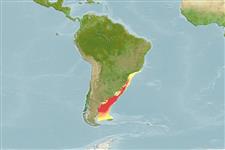Environment: milieu / climate zone / depth range / distribution range
Ecology
Marine; brackish; benthopelagic; depth range 15 - 82 m (Ref. 127778). Subtropical; 13°S - 53°S, 67°W - 40°W
Southwest Atlantic: Brazil, Argentina, and Uruguay.
Length at first maturity / Size / Weight / Age
Maturity: Lm 29.0 range ? - ? cm
Max length : 60.0 cm TL male/unsexed; (Ref. 7392)
Found on the continental shelf in colder waters. Utilized to some degree for human consumption.
Life cycle and mating behavior
Maturity | Reproduction | Spawning | Eggs | Fecundity | Larvae
Pereiro, S. and A. Vásquez, 1988. Peces marinos III. p. 65-94. In G.B. Cabal, B. Marcheti (eds.) Fauna Argentina: Peces. Centro Editor de América Latina S.A., Junin, Buenos Aires, Brazil, 102 p. (Ref. 7392)
IUCN Red List Status (Ref. 130435: Version 2024-1)
Threat to humans
Harmless
Human uses
Fisheries: commercial
Tools
Special reports
Download XML
Internet sources
Estimates based on models
Preferred temperature (Ref.
123201): 4.5 - 16.9, mean 8.1 °C (based on 170 cells).
Phylogenetic diversity index (Ref.
82804): PD
50 = 0.5005 [Uniqueness, from 0.5 = low to 2.0 = high].
Bayesian length-weight: a=0.01349 (0.00618 - 0.02945), b=3.00 (2.81 - 3.19), in cm total length, based on LWR estimates for this (Sub)family-body shape (Ref.
93245).
Trophic level (Ref.
69278): 4.0 ±0.71 se; based on food items.
Resilience (Ref.
120179): Medium, minimum population doubling time 1.4 - 4.4 years (Assuming tm=2-4).
Prior r = 0.25, 95% CL = 0.17 - 0.38, Based on 1 full stock assessment.
Fishing Vulnerability (Ref.
59153): Moderate vulnerability (44 of 100).
Climate Vulnerability (Ref.
125649): Very high vulnerability (86 of 100).
Nutrients (Ref.
124155): Calcium = 41.5 [15.4, 85.6] mg/100g; Iron = 0.644 [0.347, 1.238] mg/100g; Protein = 17.1 [14.6, 20.1] %; Omega3 = 0.38 [0.22, 0.65] g/100g; Selenium = 27.3 [14.4, 51.5] μg/100g; VitaminA = 20.5 [7.1, 69.3] μg/100g; Zinc = 0.812 [0.565, 1.212] mg/100g (wet weight); based on
nutrient studies.
